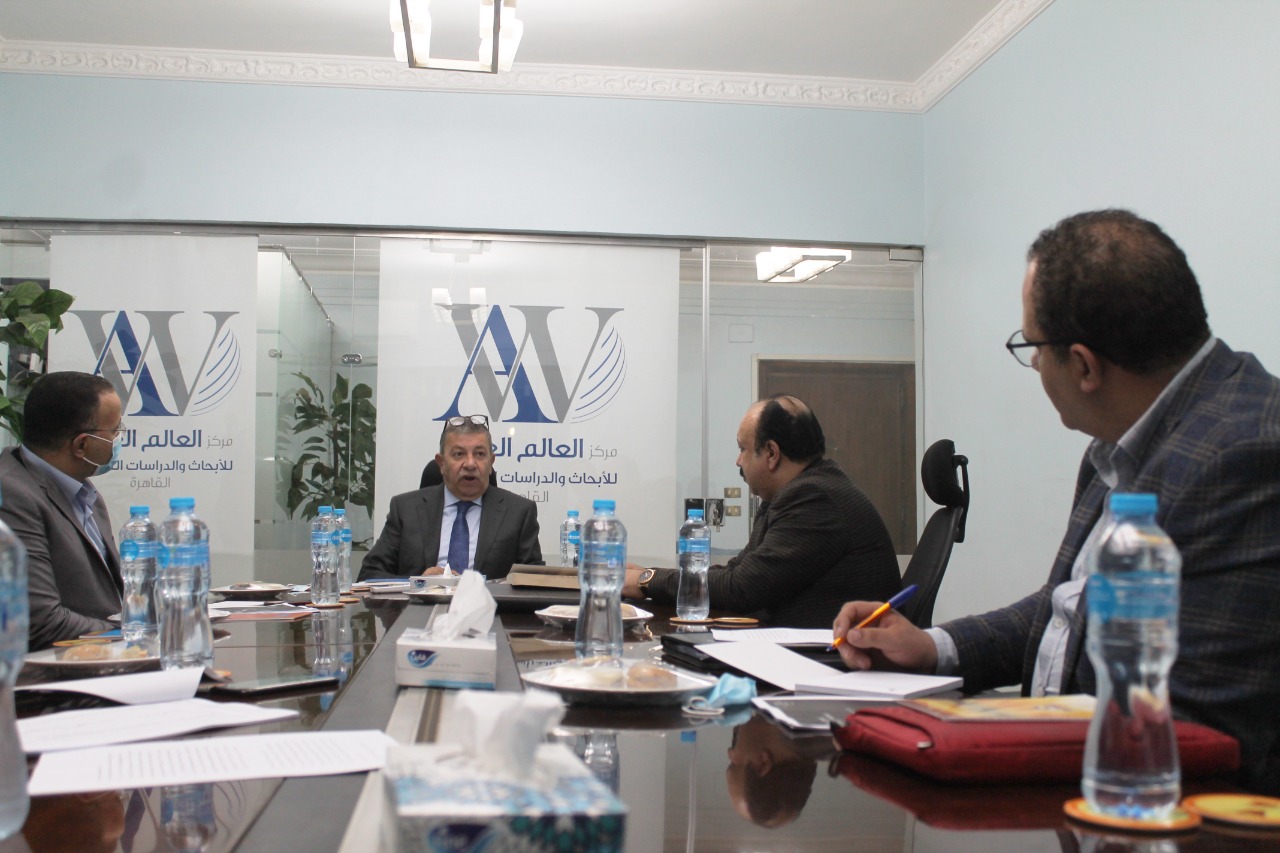A discussion panel was held at the Arab World Center for Research and Advanced Studies in Cairo, on the 23rd of November 2021, which focused on global reports produced by international organizations and think tanks, and how they have been inadequate in providing early warnings of global crises. The lead panelist was Ambassador Amr Helmy, with the participation of Dr Mohamed Ezz El Arab, Dr Mohamed Abbas Nagy, Mr. Ahmed Eleiba, and Mr. Mohamed Bassiouny. The discussion also explored how Arab countries are perceived by these international reports, and how their evaluation is sometimes influenced by political considerations and biases.
Ambassador Amr Helmy began by outlining the problems of trying to predict the future and the challenges the world faces in that respect. He pointed out that while there are numerous bodies working on the issue of predicting risks, including United Nations organizations and think tanks, the world was still taken by surprise when hit by the coronavirus pandemic. This illustrates that the world still lacks proper early warning systems to predict global crises.
Ambassador Helmy pointed out that the economic crisis in Asia in 1997 was another example of this failure. Prior to the crisis, many global institutions had praised the economic models being followed in east Asia, and the World Bank in 1993 had published a report titled “Miracle in East Asia”. As a consequence of this Asian financial crisis, the IMF sought to establish early warning systems to help prevent similar crises from occurring again. Despite these efforts, in 2008 a global financial crisis was triggered in the United States spreading rapidly to Europe and other nations, creating the largest financial crisis since the great depression in the 1930s.
Inadequate Early Warning Systems
The world appears to lack sufficient early warning systems, and those available are inefficient in that respect, according to Ambassador Helmy, including UN agencies, global financial institutions, and international civil society organizations. The reports and indexes produced by these international organizations have serious issues with respect to methodology which undermine credibility. Therefore, there has been a rising wave of criticism regarding the evaluations of these reports. The World Bank, for example, suspended the publication of its annual report on “Doing Business” in August 2021, because it became apparent that some of the data on which the ranking was based was erroneous.
Ambassador Helmy added that World Bank reports in the last 3 years, have been coming under an increased degree of scrutiny and criticism, especially after the resignation of the top economist in the bank, Paul Romer. In his resignation, he cited several reports being issued by the bank lacking accuracy and having errors in their data. Other UN organizations, such as the UNDP, have also come under fire as their most famous report, the Human Development Index, contained illogical contradictions, and its findings were in contradiction to the Global Knowledge Index that is also produced by the UNDP.
Moreover, some economic policies advocated by international organizations have deepened the crises in some countries, and therefore have complicated efforts to produce early warnings. This is especially true of policies pushed by the IMF, including privatization, liberalizing economic policies, and removing all restrictions on cash flows and investments. The IMF’s accelerated implementation of these policies led to catastrophic outcomes in some Latin American countries, according to Ambassador Helmy, and these countries still suffer due to the economic consequences of these policies. This led the IMF in 2011 to amend its policies, to take into consideration the necessity of balancing economic development with social and political stability.
Ambassador Helmy concluded that the early warning systems being used on the global level need a complete overhaul to face up to any future crises, in view of the enormous costs of the COVID-19 pandemic. It also requires international organizations to address their shortcomings that reflect negatively on their credibility, till such time, analysts and experts need to deal with their reports with a degree of skepticism and scrutiny, as their conclusions cannot be assumed as accurate.
Political Biases
Ambassador Helmy pointed out that there are clear biases in global rankings produced by international agencies and think tanks, especially regarding good governance, democratic rule, and economic competitiveness. In some indexes, countries that are politically and socially unstable, rank higher than nations that are economically sound and able to deal with sudden crises, such as COVID-19. The practice of dismissing nations from rankings without a clear explanation why, also contradicts the empirical process on which indexes are created.
Ambassador Helmy noted that political biases often become apparent when ranking Arab countries with respect to human rights and democracy, although we are witnessing problems with these issues even in developed countries. Moreover, there seems to be an unfair focus on certain regions in the world regarding human rights violations. Violations of Human Rights with respect to aggression, ethnic cleansing, crimes against humanity, genocide, the use of mercenaries, funding terrorists, and violations of international law, do not appear to receive the same attention as that accorded to breaching the human rights of individuals, such as arbitrary detention, freedom of expression, the right to peaceful protest, and restrictions on civil society, in some rankings.


